Zoho CRM and Salesforce are both popular CRMs with solid AI capabilities, but they cater to different needs. Zoho CRM is more affordable and user-friendly for small to medium businesses, while Salesforce is flexible and scalable for larger companies.
The post Zoho vs. Salesforce (2024): The Ultimate CRM Showdown appeared first on eWEEK.
Zoho CRM and Salesforce are two industry-leading customer relationship management tools known for their robust sales features, extensive customization, and AI-powered capabilities. Both can offer organizations a range of benefits, but when it comes to Zoho vs. Salesforce, choosing the right tool for your business comes down to how they differentiate themselves.
Zoho CRM is a more affordable, user-friendly solution better-suited for medium-sized companies. Its conversational artificial intelligence assistant, Zia AI, stands out for automating tasks, analyzing business data, and predicting sales outcomes. Salesforce, on the other hand, is a more expensive option that offers a more flexible, scalable option for larger teams and enterprises. It also delivers extensible AI built on the Einstein 1 platform, making it a great option for complex and longer sales cycles.
We evaluated both systems to see how they compare on cost, features, specific AI-powered tools, customization, and more to help businesses decide which CRM is right for them.
TABLE OF CONTENTS
While Salesforce and Zoho CRM are both powerful AI CRM solutions, each platform has its strengths and weaknesses. The table below provides a look at how they compare across six essential criteria—you can also skip ahead to see how we scored each platform.
| Price Range | Free to $52 per user, per month | $25 to $500 per user, per month |
| Core Features | User-friendly sales and marketing tools ideal for SMBs | Customizable sales management tools for large teams and enterprises |
| AI Capabilities | Sales prediction, lead scoring, task automation | Predictive analytics, intelligent recommendations, generative AI |
| App Integrations | More than 1,000 apps via Zoho Marketplace | Over 7,000 apps via Salesforce AppExchange |
| Ease of Use |
|
Geared toward users already familiar with CRMs |
| Customer Support | All paid plans include email, phone, and, chat support during local business hours | All paid plans include email, phone, and, chat support during local business hours |
| Overall | Good balance of features and affordability for SMBs looking to use AI in their CRM solution | Powerful AI platform with a wide range of capabilities for larger organizations seeking comprehensive AI solutions |
| Visit Zoho CRM | Visit Salesforce |
Note: All per-user prices are with a one-year commitment unless otherwise noted.
![]()
Zoho CRM is a leading cloud-based CRM platform with robust multichannel marketing features, AI-powered sales tools, and a wealth of customization capabilities. While Zoho is designed to be flexible for businesses of all sizes, it’s particularly suited for SMBs and startups needing an affordable CRM. Its customizability allows specific industries to tailor the platform to their needs, including healthcare, finance, manufacturing, and retail.
Zoho’s Zia AI optimizes your CRM data by using data mining and machine learning to analyze customer interaction, deal history, and other relevant information, identifying patterns and predicting the next best action.
Zoho CRM positions itself as a flexible platform with advanced sales and marketing tools. Some of its best features include the following:
![]()
Salesforce Sales Cloud is a sales-forward CRM popular among traditional sales teams with long cycles. It’s known for its AI-powered analytics engine, extensive customizability, and robust workflow algorithms. Salesforce is currently built on the Einstein 1 platform, which unifies your data, AI, CRM, development, and security in one place. Salesforce’s depth and flexibility appeal to large enterprises with complex needs, but smaller businesses might find its pricing generally more expensive and its interface overwhelming to implement.
Salesforce is known for its robust sales functionality, allowing businesses to manage multiple pipelines, automate complex workflows, visualize reports, and more. Some of Salesforce’s defining features include the following:
Zoho CRM is the more cost-effective choice because of its free-for-life plan and affordable pricing plans.
Zoho CRM is a great option for startups and SMBs looking for a platform with a free version and cost-effective plans. Its free edition supports up to three users and offers essential CRM features, including lead and contact management, deal tracking, and standard reporting. Its entry-level Standard plan provides features such as marketing automation, sales forecasting, and social media integration, and its Professional plan includes unlimited custom reports and dashboards, mass email, and inventory management.
Bigger teams and companies can choose Zoho’s Enterprise and Unlimited tiers for Zia AI-powered tools and more customization options. Zoho also offers a 15-day free trial of the CRM software. Users who want to unify their sales, service, and marketing solutions on one platform can also purchase Zoho CRM bundles, with CRM Flex starting at $14 per user, per month and CRM Plus starting at $57 per user, per month.
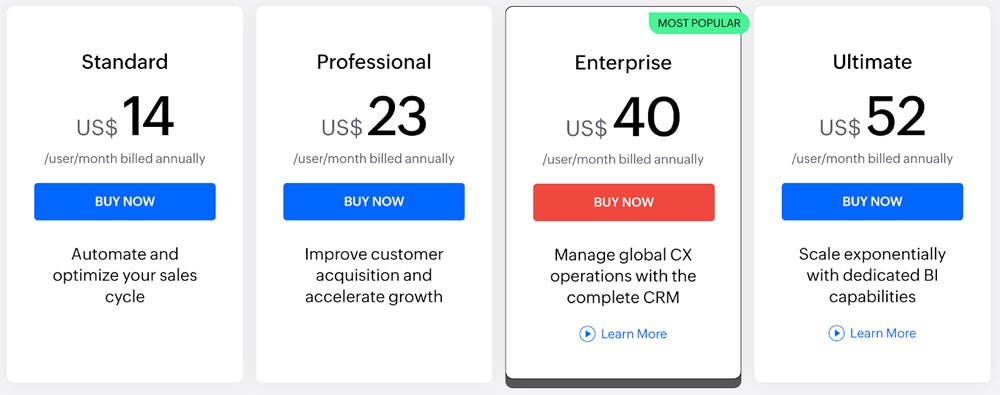
Salesforce, on the other hand, does not offer a free plan. It does offer a 30-day free trial for all tiers. Its pricing plans start at $25 per user per month, offering features like account and opportunity management, custom reports, and AI-powered activity capture. Users can upgrade to its highest plans to unlock enterprise territory management, conversation insights, opportunity scoring, and more.
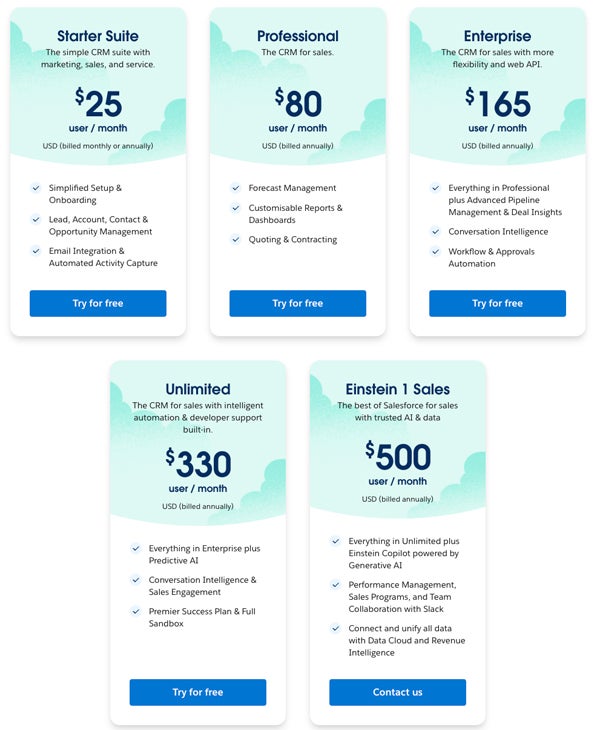
While both platforms offer unique strengths designed for different business needs, Salesforce pulls ahead in this category, showcasing a wide range of features and capabilities compared to Zoho CRM.
Zoho CRM boasts a robust contact management feature, offering a 360-degree customer view of interactions, buying history, past communications, and ticket history. Zoho also stands out as an excellent multichannel communication platform, allowing reps to engage with customers through email, built-in telephony, live chat, and social media. All customer interactions are automatically logged into the CRM system, so it’s easier for teams to organize contacts and share data about them.
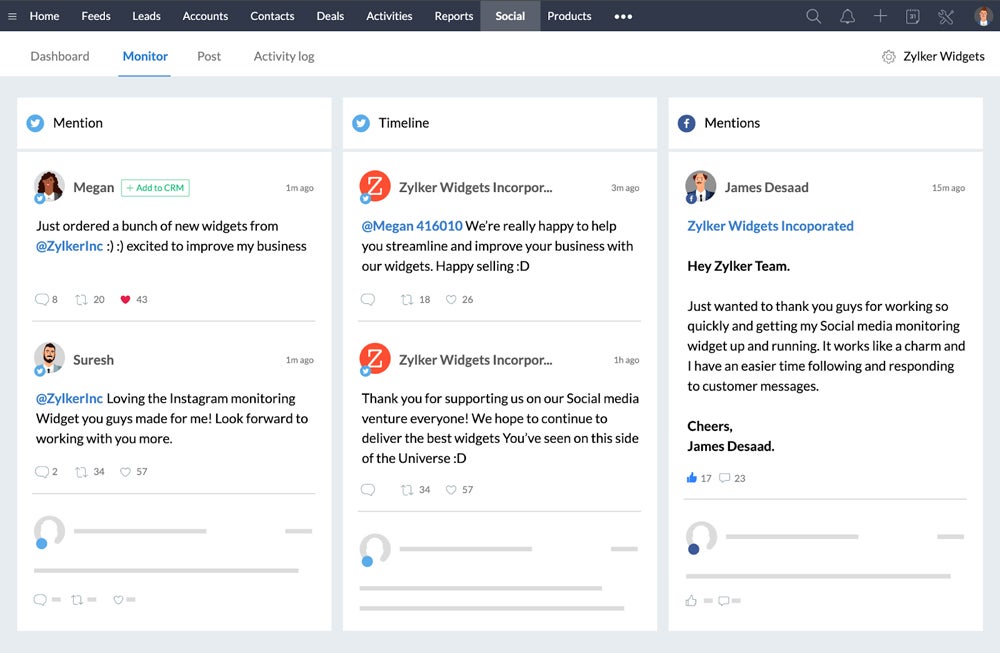
Meanwhile, Salesforce provides a comprehensive contact management system that unifies customer data, allowing sales teams to easily access crucial information. The platform allows users to create detailed contact profiles, providing a full view of its leads and customers, including interaction history, purchasing behavior, and social insights. Reps can extract contact information from Gmail, Outlook, and social media to monitor contacts’ sentiments toward the company. Salesforce also offers robust contact segmentation and filtering, helping teams quickly create targeted lists for personalized outreach campaigns.
Zoho CRM excels in lead management, helping businesses with high lead volumes and a wide range of communication channels. Zoho helps sales and marketing teams generate and nurture leads via email, phone, live chat, web forms, and social media directly from the CRM. Zoho also enables you to score leads and automatically route them to the right sales rep. However, users need to upgrade to Zoho’s advanced plans to employ Zia AI to predict which leads are likely to convert into customers.
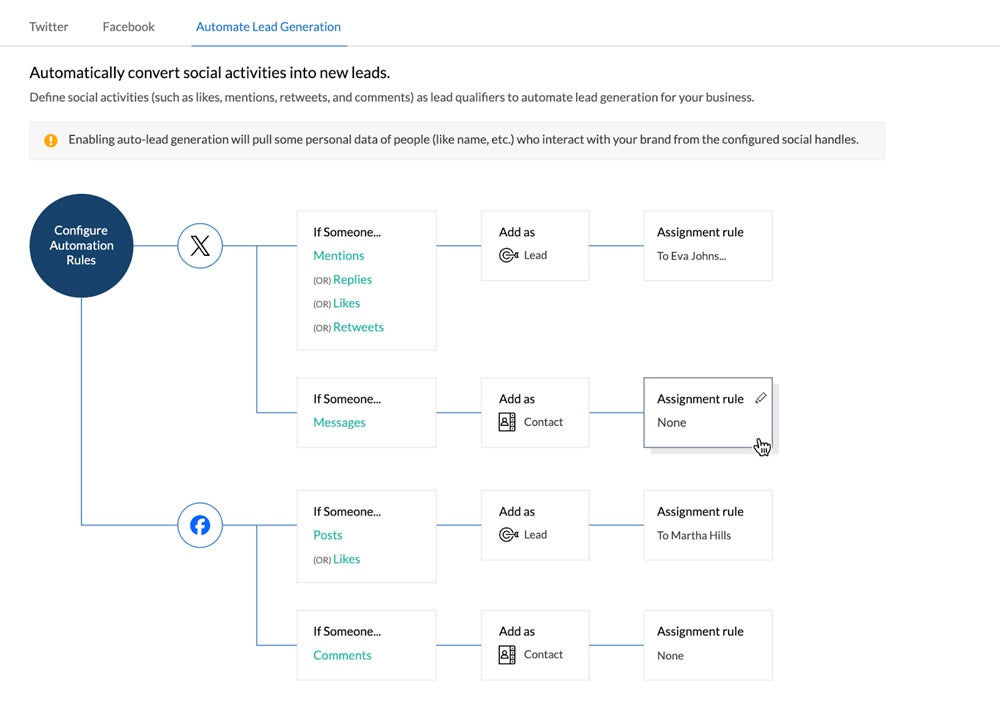
Salesforce offers a robust lead management solution that allows businesses to capture leads from multiple sources, qualify them, and nurture them through targeted campaigns. Users can easily create web-to-lead capture forms to gather information about web visitors and automatically store the data in the CRM’s new lead records for scoring and routing. From there, sales reps can redirect visitors to other site pages, send automated email follow-ups, and more. Salesforce’s Sales Path also enables team leads and reps to access relevant insights, identify the next best action for converting leads, and track key metrics.
Zoho CRM provides visual pipeline management tools that help sales teams gain detailed insights about their customers on one page. Zoho’s smart web forms can capture leads from social media and landing pages and add them to the sales pipeline. From there, teams can easily create notes, tasks, and comments, or send automatic nurturing emails. Teams can monitor their leads, customers, and deals using advanced pipeline tools such as list views, funnels, and sales forecasting features. The platform’s drag-and-drop interface also simplifies deal management and allows for seamless customization of pipeline stages.
Salesforce empowers larger teams with sophisticated management tools that allow them to track deals, visualize pipeline health, and forecast revenue with precision. Its multiple pipelines allow reps to split pipelines into leads and opportunities to easily track contacts and deals in progress and get details, including the amount of potential sales. Its pipeline inspection tools also allow teams to get a single pipeline view with multiple filtering options, so they can easily monitor the health of their deals and summarize pipeline metrics by amount, currency, and more.
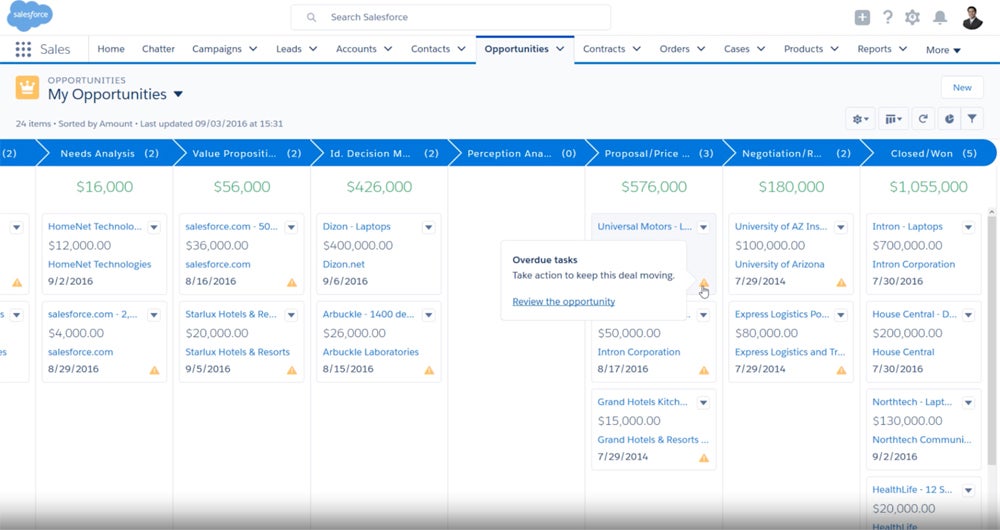
Zoho CRM is a leading analytical CRM that lets you analyze and monitor your business health and provides insights to make important decisions. Users can choose from more than 40 pre-built reports and unlimited custom dashboards that provide insights into sales activities and marketing campaigns. Zoho’s visual builder makes generating complex reports easier, and users can get a real-time preview of their reports before saving them. Larger teams that need more in-depth reporting tools can benefit from the Zoho Analytics plugin for an additional cost to access AI insights, predictive analytics, and data visualization options.
Salesforce excels in reporting and analytics, providing a wide range of pre-made and custom reports offered in every plan. Reps can build reports via its easy-to-use drag-and-drop builder and share them with specific users, groups, roles, or territories. Upgrade to Salesforce’s Professional plan for collaborative and real-time forecasting, or purchase its Enterprise tier for advanced reporting tools, opportunity splits, and enterprise territory management. Meanwhile, Salesforce’s Unlimited and Einstein 1 Sales plans give you full access to its AI-powered analytics tools, such as predictive AI, Einstein Copilot (generative AI), and connections to the data cloud.
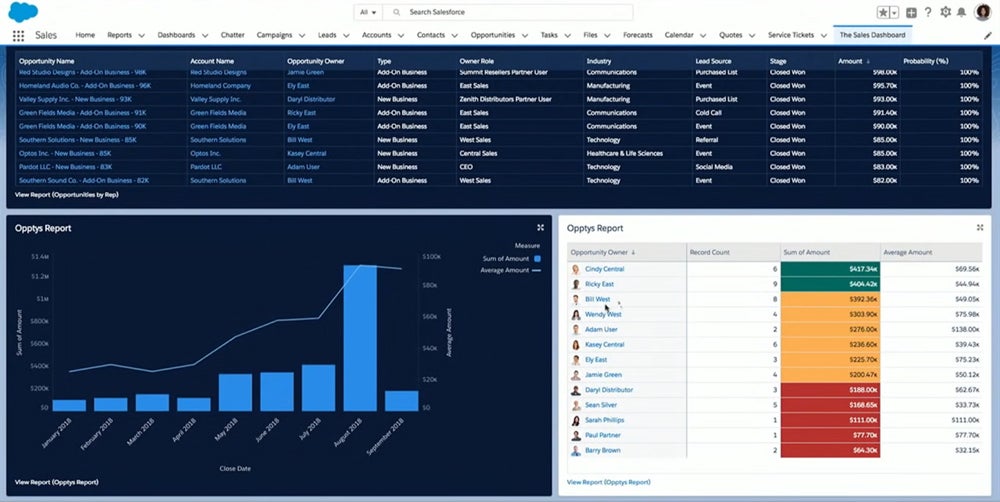
Zoho CRM offers robust operational features and all plans come with sales and marketing automation, including its free version. It comes with included predefined actions such as sending emails, scheduling tasks, and updating fields in the CRM records. Reps can set up different sales routines either instantly or at a later date, so you can follow-up on your leads at the right time. You can also set up triggers for more advanced functions, such as automated invoicing and billing upon closing deals, or sending personalized SMS notifications to your customers when their orders have been confirmed, dispatched or delivered.
Salesforce excels at providing teams with complex sales cycles with a comprehensive suite of workflow automation tools. The platform’s Flow Builder enables teams to automate processes including reviewing and approving travel expenses, sending email follow-ups, and managing support tickets. Flow Builder also provides more flexibility and power for designing sophisticated workflows, such as creating guided visual flows, interacting with external systems, and automating complex business rules. Additionally, its Einstein Next Best Action feature employs machine learning to analyze customer data and recommend the most appropriate actions for reps to include in their workflows.
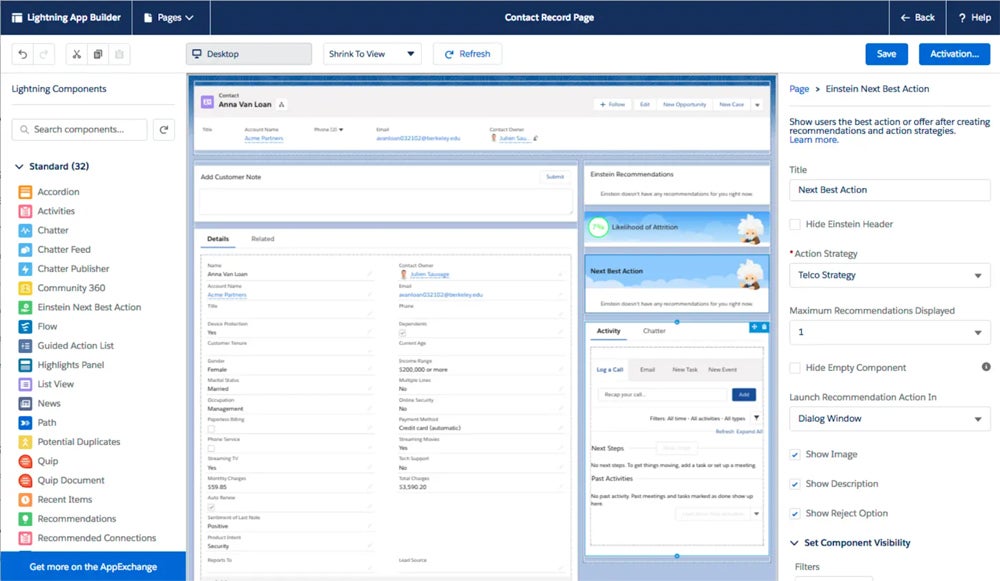
While both CRMs offer robust AI features, Salesforce has an edge over Zoho CRM when it comes to AI, primarily due to its robust Einstein 1 platform.
Zoho CRM’s conversational assistant, Zia AI, can help you extract data from multiple data sources, predict the outcome of sales activities, detect anomalies in your data, and automate processes. Zia AI understands commands and queries through chat and calls, which helps reps easily look for information from their database or record their voices to create reminders and update records. Zia AI can also enable you to predict sales, such as the win probability of ongoing deals, and assign scores based on how close these deals are to conversions.
While Zoho CRM’s Zia AI also offers robust AI capabilities, its scope is relatively limited compared to Salesforce Einstein. Additionally, Zoho only offers its AI features in its two highest tiers (Enterprise and Unlimited), which can be a costly option for smaller businesses.
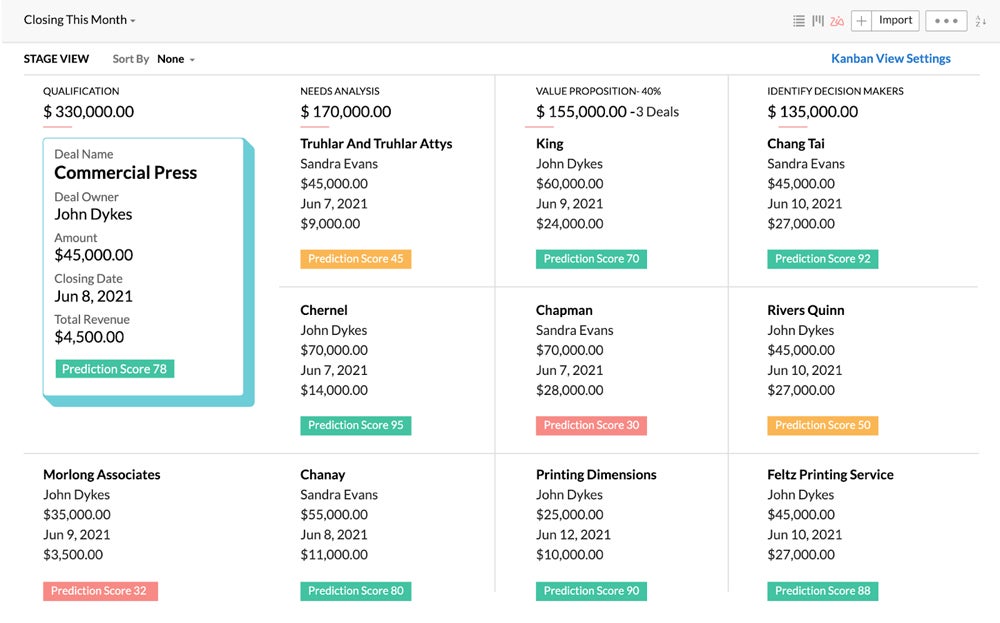
Salesforce’s Einstein 1 platform unifies data, AI, CRM, development, and security in one comprehensive solution. It enables IT specialists, administrators, and developers to facilitate the fast development of generative apps and work around an extensible AI platform. Salesforce also introduced Einstein Copilot, its customizable and conversational generative AI assistant embedded across Salesforce applications. Copilot improves the user experience by answering questions, generating content, and automating any actions in complex sales processes.
Salesforce also stands out in this area as it offers AI features starting with its entry-level plan and offers add-on options for its Professional to Unlimited tiers. Users can access full AI capabilities if they opt to purchase the Einstein 1 Sales plan, which integrates Salesforce’s AI and data features.
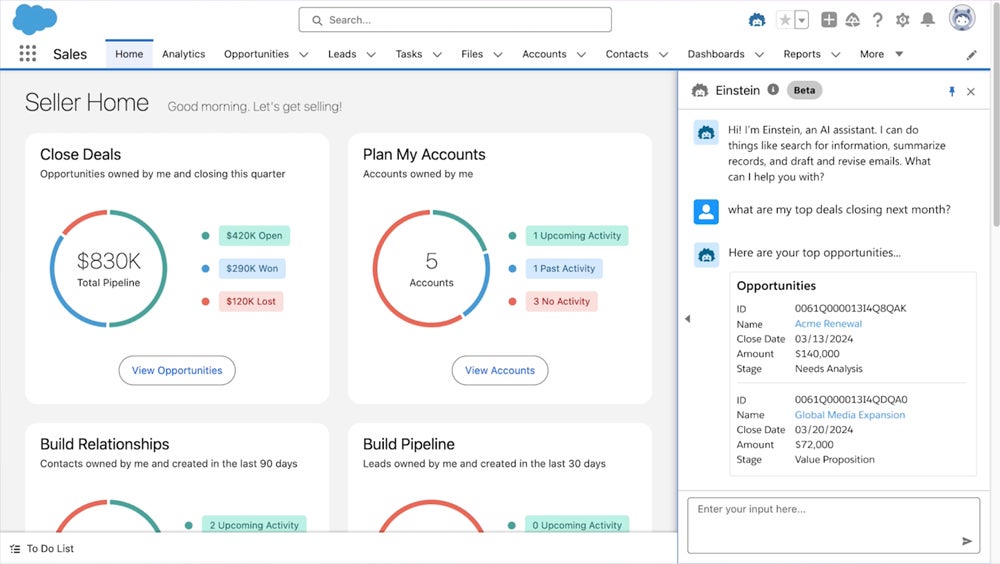
Salesforce wins in this category thanks to its number of apps and easy integration process.
Zoho CRM currently supports over 800 apps in the Zoho App Marketplace for various applications, such as email marketing, document management, automation, and more. Most of these integrations are free, including Google Workspace, Asana, Twilo, and Microsoft 365. Zoho CRM also seamlessly syncs with other Zoho products, like Zoho SalesIQ, Zoho Survey, Zoho Desk, and Zoho Projects.
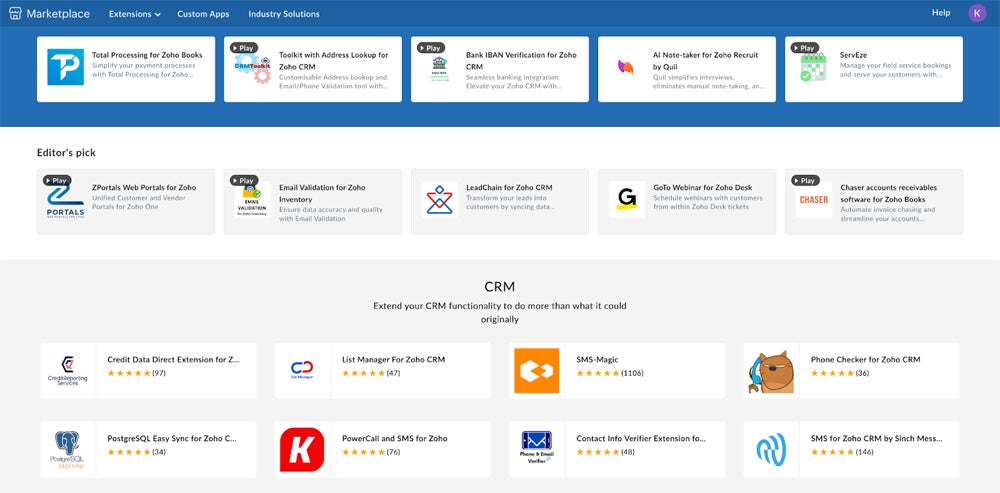
Meanwhile, Salesforce boasts an extensive ecosystem of over 7,000 app integrations via its AppExchange that companies can use to customize their CRM. Users can also sync more than 4,000 native apps built by Salesforce for sales, marketing, customer service, and other industry-specific purposes. Salesforce also offers Trailhead, a free online platform that helps users learn more about integrating native and external apps into the CRM system through easy-to-digest guides and tutorial videos.
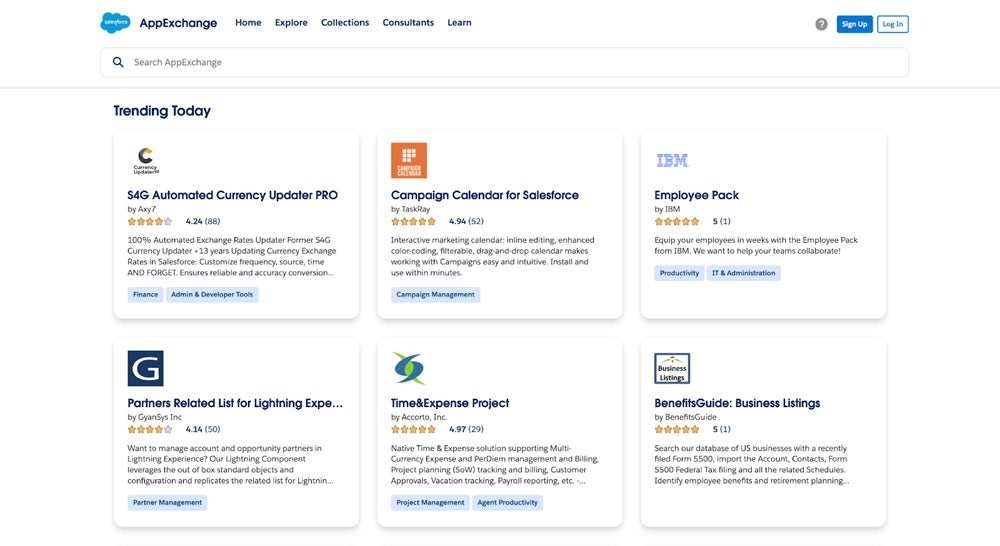
Zoho CRM is more accessible even to users with limited technical expertise because of its intuitive and clean layout.
Zoho CRM stands out for its user-friendly interface, and users often praise its straightforward design and ease of navigation. The platform can be implemented quickly, even without in-house technical support, which is ideal for startups and SMBs with smaller budgets. While both CRMs are highly customizable, Zoho’s customization is less complex than Salesforce Sales Cloud. Although Zoho’s knowledgebase and learning resources aren’t as comprehensive as Salesforce’s, users still find Zoho easier to use with its straightforward platform.
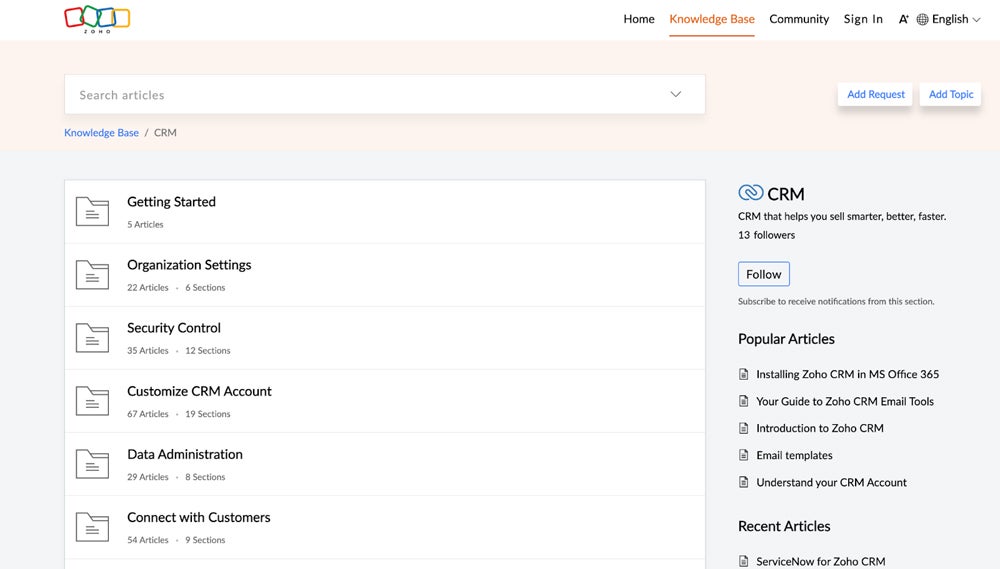
Salesforce, while incredibly robust and feature-rich, has a steeper learning curve compared to Zoho CRM. New users or businesses without CRM administrators might find the platform’s wide range of features and vast customization options appealing. Salesforce’s interface can also be clunky at times, and using some modules and settings might require more technical expertise and training. Fortunately, Salesforce’s Trailhead offers comprehensive learning resources, and its large community base supports users of all levels in mastering the platform.
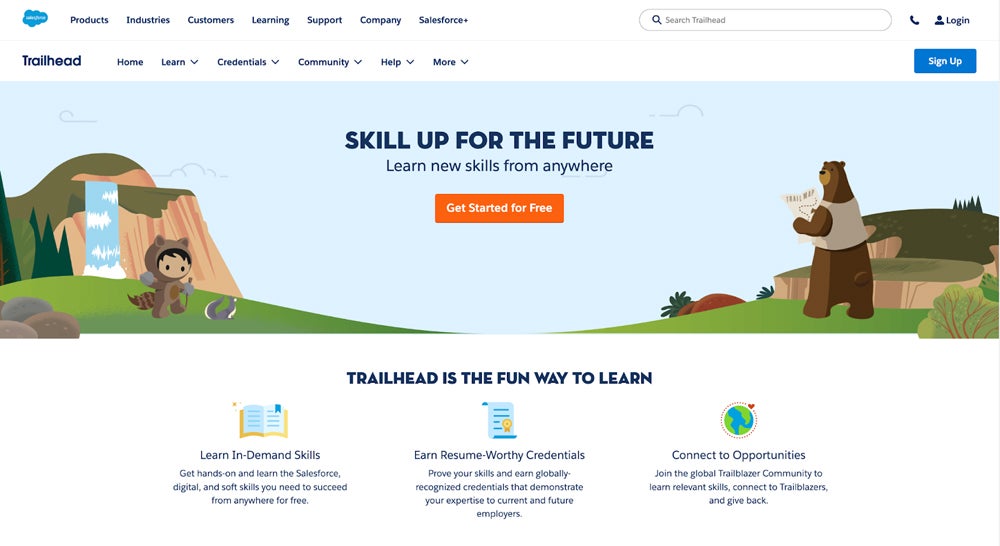
Salesforce has a slight edge in this category with its multifaceted support, vast knowledge base, and active community forum.
Zoho CRM users have access to the platform’s live chat and phone support during local business hours. Users who want to access 24/5 support can purchase Zoho’s Premium Support, which costs 20 percent of your license fee. Businesses with more than 25 users can pay 25 percent of their license fee to access 24/7 support and a dedicated account manager. However, users have reported that Zoho’s response times can be slow, and the support options may not be as comprehensive as those offered by Salesforce.
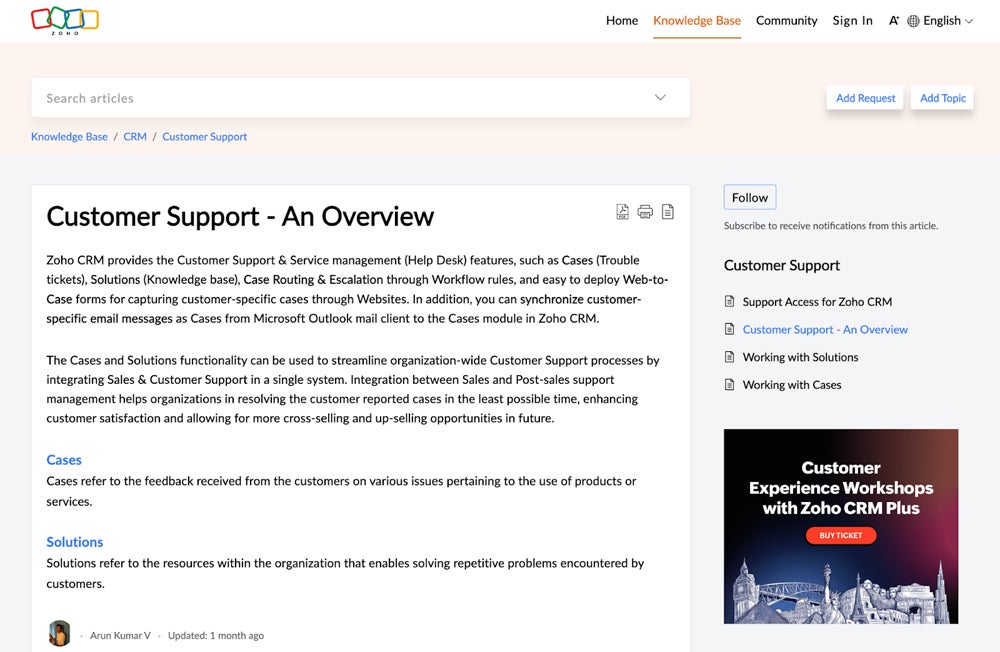
All Salesforce plans offer email, phone, and live chat support during business hours. Subscribers can purchase Salesforce’s Premier and Signature Success plans to avail themselves of expert guidance, coaching sessions, and 24/7 customer support. While premium plans can be costly for smaller businesses, users can still get standard support, access to self-guided resources and the Help Portal, and use the community forum for peer-to-peer assistance.
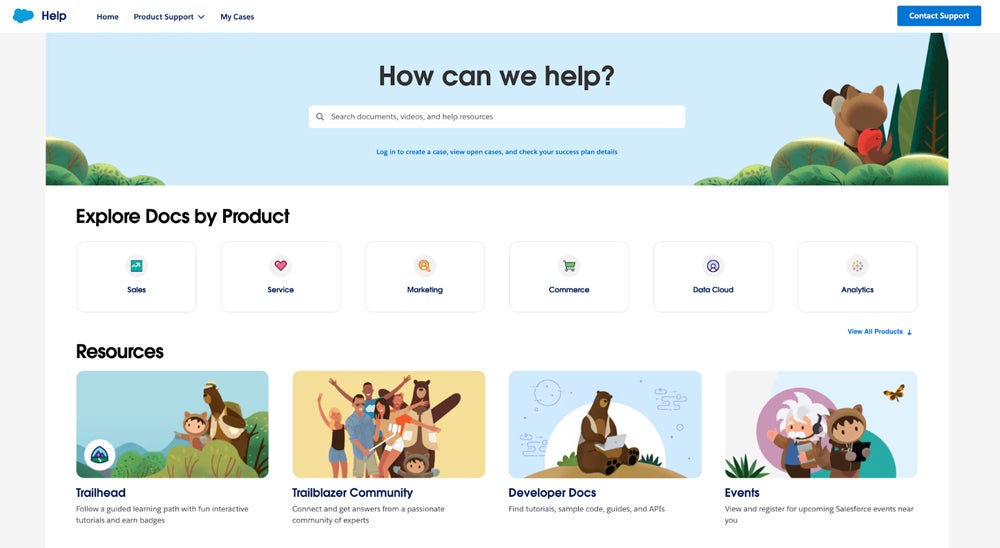
While both Zoho CRM and Salesforce are powerful CRM solutions in a crowded market, they might not be the perfect fit for your business if you need heavy or extensive customization but have a limited budget.
Zoho CRM offers an attractive price point and a user-friendly interface, but it may not be the best fit for enterprises needing heavy or extensive customization. Companies that need just a sales-forward CRM might find Zoho’s wide range of marketing features unnecessary, and it might not be worth paying for the whole platform. Additionally, businesses that need 24/7 support might consider a different platform because 24/7 support incurs additional costs of up to 25 percent of the licensing fee.
Salesforce offers a rich feature set and AI capabilities for every plan, but its pricing structure can get expensive quickly. It doesn’t offer a free version, and some add-ons can be too expensive for startups and SMBs with limited budgets. The platform’s extensive customization options and wealth of advanced features might also be overwhelming for new users and companies with limited IT resources. Businesses that lack in-house IT teams and beginners might prioritize a more user-friendly platform instead of sales.
Zoho CRM and Salesforce both have their strengths, but these platforms might not still be right for your businesses. For the best alternatives to Zoho CRM and Salesforce, we recommend Freshsales, Pipedrive, and HubSpot CRM.
![]()
Freshsales is a leading AI-powered CRM known for its advanced sales tools and high-level customization at a much lower cost than other platforms. It also boasts a user-friendly interface ideal for sales processes, team collaboration, and intelligent workflows. Users can manage their deals with its visual Kanban boards and interact with leads via its built-in telephony, email marketing, and chat tools. However, its marketing features aren’t as comprehensive as those of other CRMs. If you’re looking for a CRM with a balance of sales and marketing tools, consider HubSpot CRM.
![]()
Pipedrive is a visually intuitive sales-forward CRM that helps companies manage their leads, deals, and sales activities. This platform has robust pipeline management, offering users multiple pipelines for every plan, tracking tools, and a rotting deal feature. Its drag-and-drop interface also makes it easier for users to manage their sales processes and monitor sales through each stage, identifying bottlenecks and opportunities. Pipedrive is also known for its advanced add-ons for lead management, document management, projects, campaigns, and web visitor tracking. If you want a CRM with built-in tools for lead generation, projects, and document management, look into Freshsales.
![]()
HubSpot CRM is one of the best free CRMs on the market and integrates seamlessly with the HubSpot ecosystem. Its free version offers core CRM functionalities, including contact management, deal tracking, conversational bots, and app integrations. HubSpot stands out for its inbound marketing approach, enabling users to engage with leads through live chat, email, content, social media, and more. While its free version offers standard CRM features, its paid plans can be pricey, especially for a smaller business with a limited budget. In this case, try Pipedrive for more affordable pricing plans.
To compare Zoho CRM and Salesforce, I scored the platforms against a rubric based on the six key criteria most important to businesses when choosing a robust and AI-powered CRM. From there, I divided each category into weighted subcriteria and assigned an overall score out of five to identify the winner for each category.
I started by assessing the core features and AI capabilities of each CRM solution, as these criteria are essential for businesses looking for a feature-rich and AI-rich platform. Then, I looked at customization and integration, followed by pricing. Finally, I wrapped up the evaluation by considering each CRM’s ease of use and customer support solutions.
Salesforce and Zoho CRM are both robust sales and AI-powered platforms, but their strengths cater to different needs and use cases. While Salesforce stands out in AI capabilities and customization, Zoho CRM wins as a more user-friendly and affordable CRM. Both CRMs offer a wealth of core and advanced features, with only a slight difference in their scores in this category. Before deciding which is right for you, read other comparison reviews like this one, seek advice from experts and peers, or sign up for free versions and trials to navigate the CRM firsthand.
For an extensive list of AI vendors catering to different business needs, see our list of the top 150+ AI companies in 2024.
The post Zoho vs. Salesforce (2024): The Ultimate CRM Showdown appeared first on eWEEK.